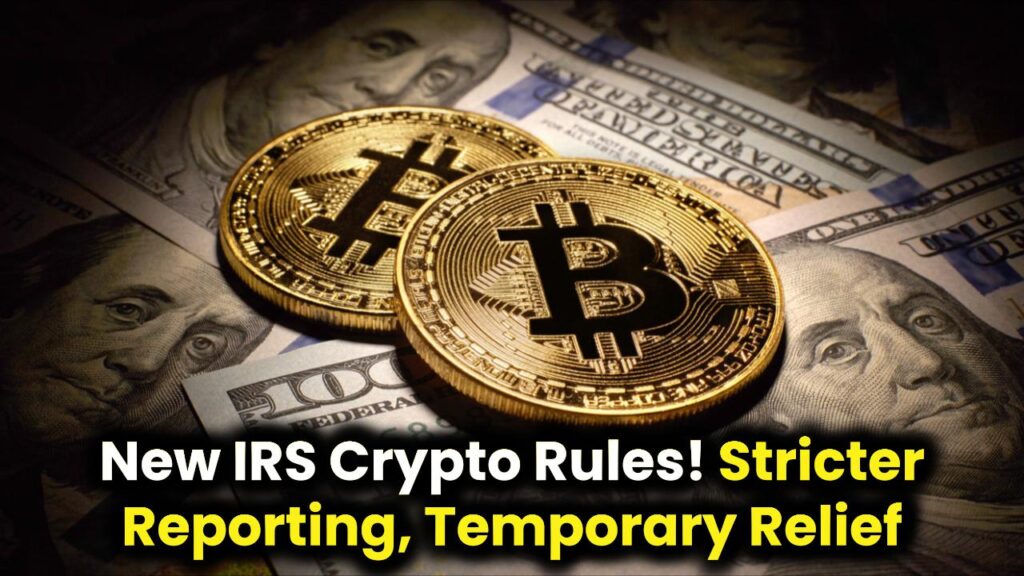
New IRS Crypto Rules: The Internal Revenue Service (IRS) has rolled out new regulations on cryptocurrency tax reporting, introducing stricter guidelines but also offering a temporary safe harbor to ease the transition. These new rules, which take effect on January 1, 2025, aim to improve transparency and compliance for digital asset transactions.
For crypto investors, traders, and businesses, these changes will impact how they report gains, losses, and track the cost basis of their digital assets. However, the IRS has introduced a temporary safe harbor provision, giving taxpayers time to adjust to the new requirements.
New IRS Crypto Rules
| Feature | Summary |
|---|---|
| Effective Date | January 1, 2025 |
| New Reporting Rule | Requires account-specific basis tracking for digital assets |
| Default Cost Basis Method | First-In, First-Out (FIFO) unless specific identification is made |
| Safe Harbor Provision | Revenue Procedure 2024-28 allows reasonable cost allocation during the transition period |
| Transitional Relief | Notice 2025-7 grants relief for 2025 if brokers cannot support identification methods |
| New Reporting Requirements for Brokers | Brokers must report digital asset transactions to the IRS, similar to traditional securities |
| Penalties for Non-Compliance | Increased penalties for failure to report crypto transactions accurately |
| IRS Official Resource | IRS Crypto Tax Guidance |
The new IRS crypto tax reporting rules aim to improve tax compliance and transparency in the digital asset space. While the stricter guidelines introduce challenges, the temporary safe harbor provision offers relief, allowing investors time to adjust their tracking methods.
With increased penalties for non-compliance, new reporting requirements for brokers, and stricter tracking obligations, crypto investors should take proactive steps to ensure compliance.
By updating record-keeping practices, using specific identification, leveraging professional tax advice, and staying informed, taxpayers can navigate these changes smoothly and avoid unnecessary penalties.
Understanding the New IRS Crypto Tax Reporting Rules
1. What Are the New Crypto Tax Reporting Rules?
The IRS is implementing stricter reporting guidelines to ensure accurate tax collection from cryptocurrency transactions. The key change is that taxpayers must now track their cost basis per account or wallet, rather than using a universal basis tracking method across multiple accounts.
Additionally, brokers and exchanges must now report digital asset transactions to the IRS, similar to how traditional brokerage firms report stock trades. This aims to close tax loopholes and enhance compliance.
2. Specific Identification Requirement
Previously, many crypto investors used the universal cost basis method, meaning they averaged the cost of all their holdings. The new rule mandates specific identification, meaning each crypto transaction must be linked to a specific purchase, including:
- The date of purchase
- The amount of crypto acquired
- The cost at the time of purchase
- The date of sale or transfer
If you don’t specifically identify the crypto being sold, the FIFO (First-In, First-Out) method will automatically apply. FIFO assumes that the oldest assets are sold first, which may lead to higher taxable gains.
3. Temporary Safe Harbor: What It Means for You
To help taxpayers transition to the new system, the IRS has introduced a temporary safe harbor provision under Revenue Procedure 2024-28. This means that if you have been using a universal cost basis, you have until the end of 2025 to allocate your cost basis reasonably across different accounts.
This gives crypto holders, traders, and businesses time to adjust their record-keeping practices without facing penalties for non-compliance.
4. Increased Penalties for Non-Compliance
Failing to properly report cryptocurrency transactions can lead to significant penalties. The IRS has increased fines and penalties for those who fail to comply with the new regulations, which can include:
- Fines for underreporting income from crypto transactions.
- Interest on unpaid taxes related to digital asset transactions.
- Potential audits for discrepancies in reported gains and losses.
How to Prepare for the New Crypto Tax Rules
1. Update Your Record-Keeping System
Keeping accurate records is crucial. You should:
- Use a crypto portfolio tracker to monitor each wallet separately.
- Maintain detailed transaction logs (date, amount, price, and wallet details).
- Store purchase receipts and transaction confirmations.
2. Understand Your Cost Basis Method
The new regulations require a wallet-by-wallet cost basis calculation. If you do not use specific identification, the IRS will default to FIFO, which can increase taxable gains.
3. Take Advantage of the Safe Harbor Period
If you previously used a universal cost basis, take advantage of the IRS safe harbor provision to properly reallocate your cost basis before 2025.
4. Work with a Tax Professional
The new regulations are complex. Consulting a crypto tax accountant can help ensure you remain compliant while minimizing your tax burden.
5. Monitor IRS Updates and Guidance
The IRS may issue additional clarifications and guidelines regarding crypto taxation. Stay informed by checking official IRS publications and trusted tax advisory services.
How to Check If Your Car Is Taxed in the UK – Avoid Fines!
NY Child Tax Credit 2025– Get $1,000 Per Child Eligibility & Payment Dates
FAQs On New IRS Crypto Rules
1. Do I Need to Report Every Crypto Transaction?
Yes, every crypto transaction (buy, sell, trade, or transfer) must be reported on your tax return.
2. What Happens if I Don’t Identify My Cost Basis?
If you fail to identify which assets you are selling, the IRS will default to FIFO, which could increase your taxable income.
3. How Does the Safe Harbor Rule Help?
The safe harbor rule gives you time to adjust your cost basis allocation across different wallets before the new regulation takes full effect.
4. What Are the New Broker Reporting Requirements?
Starting in 2025, brokers and exchanges must report crypto transactions to the IRS in a manner similar to stock transactions. This includes issuing Form 1099-B to users.
5. Can I Use Crypto Tax Software to Track My Transactions?
Yes! Using tools like CoinTracker, Koinly, or TokenTax can simplify record-keeping and ensure compliance.







